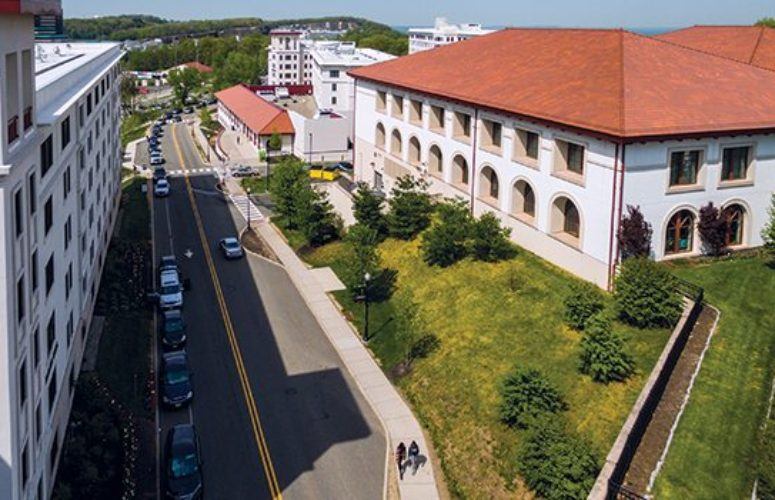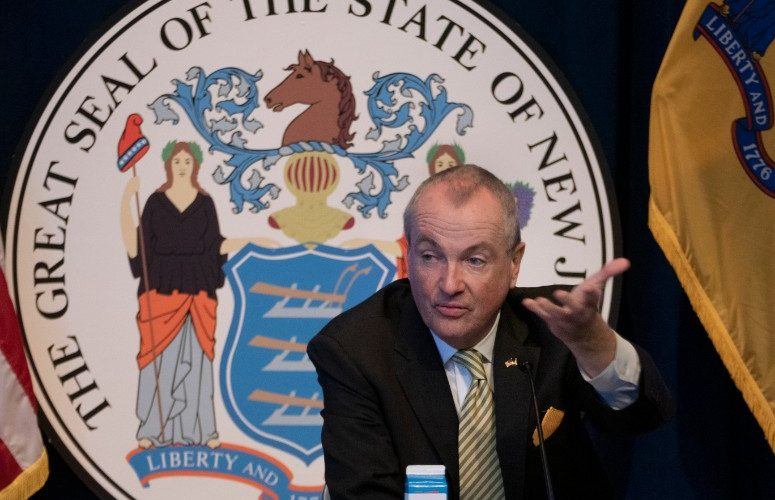
Public/Private Partnerships Spark College Campus Growth
Discover why and how higher education institutions are teaming up with developers to expand campus offerings and lifestyles.
By Eric C. Peterson, Contributing Writer On Sep 19, 2016Faced with required campus upgrades – both growth-related and for the changing needs of their student bodies – New Jersey’s institutions of higher learning have increasingly sought private sector help. Much of the trend is financial – the result of schools’ limited borrowing capacity and other constraints. Meanwhile, private-sector developers have been more than willing partners in developing and building new facilities.
“From a global perspective, higher education faces some grave challenges, everything from changing demographics, concerns about the value of higher education, and the cost of higher education (people ending up in debt),” says Curt Heuring, vice president, administration at The College of New Jersey (TCNJ). “All of these negative forces need resolution, one in which we don’t use our money for construction, so it doesn’t translate into added tuition or fees for debt service.”
One boost for such public/private partnerships has been the New Jersey Economic Stimulus Act of 2009, which “allows a public institution to partner with a private company,” says Greg Lentine, director, campus development, for The PRC Group, West Long Branch. One advantage: “When a public institution goes out to bid, it has to take the lowest bidder and often has to deal with cost overruns. We can go out, as a private company, and get the best people at the right price, and guarantee our price. It doesn’t cost the college a dime.”
The Economic Stimulus Act has been renewed three times, but, at press-time, the need for another extension currently faces a stalemate in Trenton over union wages and benefits. That may put some projects on hold, but there is optimism it will get done.
Indeed, TCNJ’s Campus Town project was in the works even before the act was passed in 2009. “We started planning with no idea the legislation was on anyone’s mind,” Heuring says. “We were going to try to do the project through an auxiliary of the college, but when the legislation came through, the timing was perfect.”
And TCNJ found a partner in The PRC Group for a $120-million, nine-building project with 278,000 square feet of residential and 83,000 square feet of retail space. A first phase of 446 apartments was quickly leased, according to Lentine, with a second phase of 166 units slated for completion at press-time. Major retailers include Panera Bread, Mexican Mariachi Grill, Verizon Wireless, and InFocus Urgent Care. A seasonal farmer’s market is also in the mix.
“That mix is not only good for students, but also the neighborhood,” Lentine says. “What we’ve tried to do is focus not just on the college, but also the community.”
From TCNJ’s perspective, the need for Campus Town arose from a strategic plan calling for additional student housing, while forming relationships outside of the institution, Heuring notes. From a financial standpoint, TCNJ “didn’t have a lot of debt capacity left,” he says. “The board was only inclined to do it if it had zero impact on the college’s debt capacity, debt rating or outlook.”
Another financial benefit: The revenue stream over the 50-year life of PRC’s ground lease for the property will be about $48 million.
The bottom line is that Campus Town is being completed with “zero cost to students and to taxpayers,” Lentine says. “It’s totally privately financed and privately built, allowing the college to focus on education, not housing.”
From an institutional perspective, TCNJ has evolved from a commuter school known as Trenton State into a living/learning community that needed the “vibrant campus/town environment our students were looking for,” Heuring says. “Campus Town also took an underperforming property of old houses and oil tanks – not a very attractive edge for the college – and put a brand-new collegiate town center right at our doorstep.”
The initial project benefiting from the New Jersey Economic Stimulus Act of 2009, however, was The Heights, a $211-million project for which Montclair State University teamed with Capstone Development Corp. of Birmingham, Alabama, with financing provided by Provident Resources Group. The residential complex includes 548,000 square feet of living quarters and a 24,000-square-foot dining area on 5.5 acres.
Having grown from 12,000 students to over 20,500, “the university identified the need for additional undergraduate housing,” says Jack Shannon, vice president, university advancement. “Many state universities are increasingly constrained, with limited and declining public funding support and sporadic capital infusion. We were compelled to identify an alternative financing arrangement, and the Economic Stimulus Act allowed us to partner with the private sector real estate community to deliver high-quality facilities while reserving our limited debt capacity for academic-focused building needed on campus.”
The Heights was financed through a tax-exempt student housing revenue bonds issued by the New Jersey Economic Development Authority (NJEDA). For ongoing operation, “the university provides residential housing services, resident directors and programming within the facilities,” Shannon explains. “Capstone handles preparation of an annual operating budget, capital refreshment, and day-to-day maintenance and physical operations.”
The Heights operates under a 30-year ground lease. Once the bonds are retired, the ground lease will terminate and ownership will revert to the university.
As the state university, Rutgers has multiple public/private partnership projects ongoing, among them the $330-million College Avenue Redevelopment in New Brunswick. “It started with a piece of property owned by the New Brunswick Theological Seminary that sat in the middle of our campus,” explains Antonio Calcado, senior vice president, institutional planning and operations. After conversations over a period of many years with the seminary, the locally-based New Brunswick Development Corp. (Devco) entered, and a deal was completed.
“We have a long history of doing projects with Rutgers,” says Devco President Christopher Paladino. “We have a shared philosophy that if, for both the public side and private side, a project doesn’t bring something of true value to the table, it’s not a partnership … and this project is truly transformative.”
The result is a project much larger than originally planned and a four-way partnership between Rutgers, Devco, the seminary and Rutgers Hillel. Components of the 860,000-square-foot redevelopment include Rutgers Honors College, completed a year ago; a new 212,000-square–foot University Academic Building with over 3,000 seats; a mixed-use student apartment complex named The Yard @ College Avenue, slated for completion at press-time; a public plaza; and a new campus for the seminary.
Through the partnership, “we were able to access tax credits and funding sources we would not have been able to access as a not-for-profit,” Calcado says.
Among the benefits: $35 million of New Jersey Urban Transit Hub tax credits, “the first time they were used for a university project,” Paladino notes. “A university isn’t eligible because it’s not a business, but Devco qualified as a business,” he adds, noting that the credits are being used to subsidize the housing and mixed-use components.
Another benefit: “Because we had been working on this project for a while, we were able to be very shovel-ready and able to bolster the university’s application for an additional $50 million in bond funds,” he says.
“Investment and reinvestment is paying dividends here,” Paladino says, noting that Devco is launching a 1.8-million-square-foot project in downtown New Brunswick. “Almost every tenant we’re talking to is interested in New Brunswick, and one reason is the ability to partner with the university and access the talent pool.”
Devco, meanwhile, has provided the model and staff support for AC Devco, for the Gateway project in Atlantic City that will include a 56,000-square-foot academic building for Stockton University. It will include various academic uses, apartments for students, and retail when completed in 2018.
Rutgers, meanwhile, also partnered with Devco on 15 Washington Street in Newark, a 260,000-square-foot building that has been repurposed with 350 beds for student apartment-style living. “It is a magnificent building and is the ultimate in sustainability in terms of not knocking it down, but bringing it back to life,” Calcado says.
15 Washington was a project in the works for some time, and came to fruition in part because “we were able to fill a budget gap with the help of the NJEDA’s Economic Redevelopment and Growth [ERG] program,” Paladino says.
Two other projects for Rutgers-Newark include the former Hahne’s building, with 50,000 square feet used primarily for the arts. The joint venture partner is L&M Development. Also, teaming with Ron Beit and the RBH Group, Rutgers is developing the Honors Living-Learning College, with 160,000 square feet of university space, 30,000 square feet of retail, and a 400-car parking deck.
Additionally in Newark, the New Jersey Institute of Technology (NJIT) is working with multiple developers on the MLK Gateway redevelopment in University Heights, with a total projected scale in the neighborhood of $1 billion. “It is a gateway to NJIT, Rutgers-Newark and St. Michaels Medical Center,” says Andrew Christ, NJIT’s vice president, real estate development and capital operations.
A residential honors college and a “Greek” village have already been completed by NJIT. Named a decade ago by the City of Newark as master redeveloper of the area, which is adjacent to the Broad Street Station, NJIT is “directing traffic,” Christ says. “Everything built and designed there has to have our approval before they can go to the planning board.”
To begin the process, NJIT already owns two buildings there and is under contract to sell one to the Newark-based Hanini Group, which will create 79 market-rate residential units with ground floor retail on the east side of MLK Blvd. On the west side of MLK Blvd., NJIT owns one parcel, and most of the land is owned by St. Michaels. The PRC Group was recently tapped to develop that portion. “They’re in the early stages of putting together a plan,” Christ says. “The project will have some NJIT-related functions, and we still have a need for additional parking.
“It’s really about creating a vibrant 24/7 community in an area in need of redevelopment,” he says. “There will be opportunities for graduate student, faculty and staff housing that will be constructed, operated and maintained by a developer. It will provide services to NJIT with no burden on the State of New Jersey or anyone related to NJIT.”
Rowan University in Glassboro set an early standard for institutional public/private partnerships with the $350-million Rowan Boulevard. Encompassing 26 acres on a one-third mile corridor from campus to a new town square, the multi-phased project, at build-out, will feature 185,000 square feet of retail, 40,000 square feet of offices, 307,000 square feet of residential, and more. Sora Northeast developed the master plan and completed the initial two phases, and Lawrenceville-based Nexus Properties is handling the final two phases.
“We are currently completing a 60,000-square-foot, multi-use building for Rowan’s College of Graduate and Continuing Education and an adjacent 1,200-space parking garage, and will lease them to the university,” notes Nexus COO Dante Germano. “We will initially own and operate the classroom and garage facilities and lease them to the university. Under the terms of the partnership agreement, ownership of the classrooms will revert to Rowan, and we will continue to own and manage the parking garage.”
In 2015, Nexus completed 220 Rowan Boulevard, a mixed-use building. The current timeline is for the three-building A3 phase to be completed in 2017, and the three-building A4 phase to be completed in July, 2018. The six buildings and parking garage in the final two phases, worth $170 million, are benefiting from $50 million in tax credits approved by the NJEDA.
From an ownership standpoint, the Borough of Glassboro owns all of the property, and Nexus has long-term ground leases.
“We have a large economic engine with Rowan here in Glassboro, and expanding into Harrison Township and Mantua,” says Glassboro Administrator Joseph Brigandi, Jr. “That provides a lot of economic stimulus and opportunity for people from an education standpoint, and from a job standpoint.”
Back in Northern New Jersey, the $400-million West Campus is New Jersey City University’s (NJCU) venture into public/private partnerships. A tax PILOT was recently approved for the initial two phases, combining 330 market-rate apartments, 21,250 square feet of commercial space and structured parking, worth $97 million. Ground was slated to be broken in September, with the Claremont Group as the developer.
A second project, developed by KKF University Enterprises, will add 301 apartments and 11,000 square feet of commercial, valued at $83 million. And a third project, being done by Crossroads Cos., will add a 62,000-square-foot ShopRite, a 37,500-square-foot LA Fitness, a restaurant and parking. The multi-phase build-out follows a new 425-bed residence hall already under construction by Georgia-based RISE.
“The benefit is two-fold,” explains NJCU President Dr. Sue Henderson. “We wanted to help revitalize the community – and there are 22 acres of the city that has yet to be redeveloped. We also have other facilities that we wanted to make sure are constructed on that particular piece of property – it was something we needed to do, but didn’t have to take the risk of doing the construction.
“The other benefit is that each of the developers will be paying us for a ground lease, and the proceeds will pay off the vast majority of a mortgage for an academic building we want to develop,” Henderson says. “This is a way for us to construct badly needed academic facilities without having to increase students’ facilities fees.”
Yet another university – Rider – may be poised to venture into a public/private partnership. Earlier this year, President Gregory Dell’Omo indicated in his inaugural address that the university would be looking into land development.
“We are currently evaluating the feasibility of a mixed-use development to be built at the front of our Lawrenceville campus,” says Kristine Brown, assistant vice president, university marketing and communications. “It would include retail, dining and student housing options. Our goal is to create an environment that can be enjoyed not only by the Rider community, but our neighbors and visitors as well. We are about four to six months from being able to talk more concretely.”
Bottom line, “there are many things you have to look at in these partnerships,” says PRC’s Lentine. “They don’t automatically work – there has to be demand for housing and retail. With the amount of jobs and economic stimulus that can be created for both students and the community, however, a project can provide a good boost.”
For Calcado of Rutgers, “the driver is good business sense and what makes the most sense to accomplish your goals, all while watching out for the interests of the community.”
“In an increasingly resource-constrained environment, these types of partnerships allow the university to provide very important, critically needed services to its students,” Montclair State’s Shannon concludes. “They can reserve a limited debt capacity, in our case, while making sure that we also have high-quality academic facilities available.”
Related Articles:






